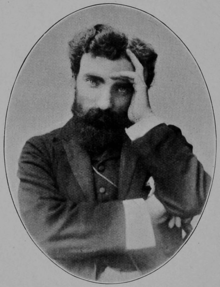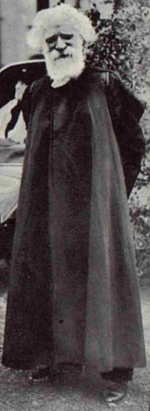Josiah Oldfield
Josiah Oldfield (23 February 1863 – 2 February 1953) M.A., D.C.L., M.R.C.S., L.R.C.P was an English lawyer, physician and promoter of his own variant of fruitarianism which was virtually indistinguishable from lacto-ovo vegetarianism.
Josiah Oldfield | |
|---|---|
 | |
| Born | 28 February 1863 Shrewsbury, England |
| Died | 2 February 1953 (aged 89) Doddington, Kent, England |
| Occupation | Physician, writer |
Biography
Oldfield was born on 28 February 1863 in Shrewsbury.[1] He obtained second-class honours in civil law and theology from University of Oxford.[1] As a barrister he was called to the bar by Lincoln's Inn and practiced on the Oxford court circuit.[1] He studied medicine at St. Bartholomew's Hospital Medical School and qualified in 1897.[1] In 1901, Oxford University awarded him a doctorate in civil law for his thesis on capital punishment.[1] He founded the Abolition of Capital Punishment in the same year.[1] Oldfield's thesis The Penalty of Death, combined criminological, legal and sociological arguments to call for abolition of capital punishment.[2]
Whilst a student at Oxford, Oldfield became a vegetarian and concluded meat-eating was unnecessary.[1] He befriended Mahatma Gandhi at Oxford.[3] Oldfield was assistant master at Chipping Campden School for two years, he also founded The Campdonian magazine.[4] During World War I, Oldfield held a commission as a Territorial in the Royal Army Medical Corps and commanded a field ambulance.[1] He was awarded the Territorial Decoration.[1]
Oldfield married Gertrude Hick on 29 September 1899 at Wakefield Cathedral.[3] They had twin daughters in 1902 but their marriage was not successful and they broke up.[3] He became a fellow of the Royal Society of Medicine in 1920.
Fruitarianism

Oldfield was senior physician to the Lady Margaret Fruitarian Hospital in Bromley, which he founded in 1903.[1][5] He was a member of the Fruitarian Society whose members lived on "the produce of harvest field, garden, forest and orchard, with milk, butter, cheese, eggs and honey".[3] No alcohol, fish or meat was permitted at the Lady Margaret Fruitarian Hospital. The food was cooked in coconut oil.[6] Oldfield also founded the fruitarian Margaret Manor hospital in Doddington, Kent.[5][7]
His type of fruitarian diet was not a strict type of fruitarianism. A reviewer in 1909, noted that "as fruitarian dietary includes milk, butter, eggs, cheese, and honey, along with fruits, nuts, and vegetables, healthy existence is quite possible for Dr Oldfield and his followers."[8] A recipe of his "Margaret Plum Pudding" was included in Cecilia Maria de Candia's cookbook, The Kitchen Garden and the Cook.[9]
Oldfield was not a vegan, as he consumed dairy products and eggs. He recommended a daily diet of dandelion leaves, eggs, grapes, honey, lettuce, milk, salad, and watercress.[10] In 1931, he commented that "I am proud to say that the only point on which we of the Fruitarian Society disagree with Mr. Gandhi is that Mr. Gandhi will not eat eggs, because they contain Life."[11]
Oldfield was President of the West London Food Reform Society, a vegetarian group based in Bayswater, founded in 1891.[12] Edwin Arnold was vice-President and Gandhi was Secretary.[13]
He was associated with the London Vegetarian Society (LVS) and editor for their publication, The Vegetarian. Oldfield was also the secretary of the Vegetarian Federal Union.[14] He was a member of the Order of the Golden Age and the Humanitarian League.[14][15]
Oldfield authored the entry "Vegetarianism," for the Encyclopædia Britannica (11th edition, 1911). Oldfield did not identify as a vegetarian. He stated that "I object absolutely to vegetarianism, because the word smacks of onions and cabbage. It gives people the idea that you live on watercress and browse on odds and ends of garbage."[16] He substituted the word fruitarianism for vegetarianism, which was controversial. The Vegetarian Society were in disagreement with Oldfield’s assertions.[16]
Religious beliefs
In 1891, Oldfield attempted to convert Gandhi to the Anglican faith and urged him to read the Bible.[12] However, by the 20th century he had changed his faith. In 1904, he commented that "as a medical man, seeing much of pain and suffering and dying, my experience does not lead me to think that it is the profession of the Christian creed which is by any means the sole method of securing happiness of soul in this world, or which removes the fear of passing on to the next."[17] Oldfield concluded that a "wider conception of God" was needed.[17]
Oldfield is listed in A Biographical Dictionary of Modern Rationalists as a theist with mystic ideas about the soul.[18]
Selected publications
- Tuberculosis: Or Flesh Eating a Cause of Consumption (1897)
- The Penalty of Death: Or, the Problem of Capital Punishment (1901)
- Essays of the Golden Age (1902)
- The Penny Guide to Fruitarian Diet and Cookery (1902)
- Myrrh and Amaranth (1905)
- The Value of Fruit as Food (1906)
- . Encyclopædia Britannica. 27 (11th ed.). 1911.
- The Raisin Cure (1923)
- Fasting for Health and Life (1924)
- The Dry Diet Cure (1925)
- Get Well and Keep Well (1926)
- Eat and Get Well (1927)
- Eat and Keep Young (1928)
- Eat and Be Happy (1929)
- Healing and the Conquest of Pain (1944)
- The Mystery of Birth (1949)
- My Friend Gandhi (Reminiscences of Gandhiji, 1951)
- The Mystery of Death (1951)
- A Popular Guide to Fruitarian Diet and Cookery (1952)
References
- Josiah Oldfield, D.C.L., M.R.C.S.” The British Medical Journal, vol. 1, no. 4806, 1953, pp. 407–407.
- Pittard, Christopher. (2019). Grant Allen's “Jerry Stokes”: Detective Fiction, the Death Penalty, and the Scene of Writing. Victorian Periodicals Review 52 (2): 235–254.
- The Gissing Journal, Volume XLIII. (January 2007).
- Dr. Josiah Oldfield, Founder of 'The Campdonian' Magazine. Chipping Campden School. Retrieved 8 January 2020.
- "Oldfield, Dr Josiah (case 20178) Warden of Oriolet Hospital, Loughton, Essex (vegetarian): document file and key file". The National Archives. Retrieved 8 January 2020.
- Guha, Ramachandra. (2013). Gandhi Before India. Penguin India. p. 38
- "No.13 Lady Margaret Manor". Doddington Historic Buildings. Retrieved 8 January 2020.
- Chambers's Journal. W. & R. Chambers, 1909. p. 514
- De Candia, Cecilia Maria. (1913). The Kitchen Garden and the Cook. London. p. 235
- Dandelions for Health. The Popular Science Monthly, 1920.
- "Foreign News: Royal Tea". Time. Retrieved 8 January 2020.
- Wolpert, Stanley. (2001). Gandhi's Passion: The Life and Legacy of Mahatma Gandhi. Oxford University Press. p. 22. ISBN 0-19-513060-X
- Gandhi, Rajmohan. (2008). Gandhi: The Man, His People, and the Empire. University of California Press. p. 42. ISBN 978-0-520-25570-8
- Weinbren, Dan (1994). "Against All Cruelty: The Humanitarian League, 1891-1919". History Workshop (38): 86–105. ISSN 0309-2984. JSTOR 4289320.
- Bates, A. W. H. (2017). Anti-Vivisection and the Profession of Medicine in Britain: A Social History. Palgrave Macmillan. p. 72. ISBN 978-1-137-55696-7
- "Fruitarian Society Feature". The Order of the Golden Age. Retrieved 8 January 2020.
- Courtney, William Leonard. (1905). Do We Believe? A Record of a Great Correspondence in "The Daily Telegraph: October, November, December, 1904. London: Hodder and Stoughton.
- McCabe, Joseph. (1920). A Biographical Dictionary of Modern Rationalists. London: Watts & Co. p. 566
External links
| Wikimedia Commons has media related to Josiah Oldfield. |
- Dr. Josiah Oldfield (The Order of the Golden Age)
- Lady Margaret Hospital (Lost Hospitals of London)
- Josiah Oldfield at the Imperial War Museum